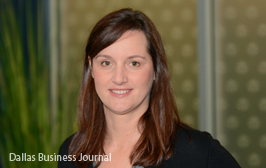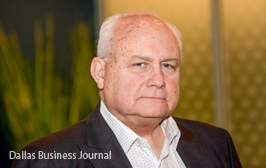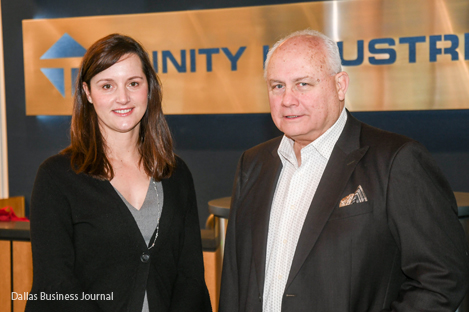© 2018 The Texas Lawbook.
Finalist: Business Litigation of the Year
Finalist: General Counsel of the Year for a Mid-sized Legal Department
Finalist: Non-GC of the Year for a Mid-sized Legal Department
By Mark Curriden
(Jan. 17) – Sarah Teachout was in the carpool lane picking up her 15-year-old son from Jesuit on a fall day in 2017 when her phone buzzed. A PACER notice popped up that the U.S. Court of Appeals for the Fifth Circuit had issued a decision in a major business dispute involving Trinity Industries, where she is deputy general counsel.

“Reversed and rendered.”
For four years, the Dallas industrial supply company battled a wave of litigation that accused Trinity of fraud and making a defective guardrail system. A federal jury in 2014 ruled Trinity violated the federal False Claims Act, which led to a record-smashing $663 million judgment.
Suddenly, Trinity faced dozens of new lawsuits across the country seeking billions of dollars in damages.
There were wrongful death and product liability cases filed. Shareholder litigation was initiated. The federal government even opened a criminal investigation.
“Once that verdict came down, it seems like we were hit with wave after wave after wave of more lawsuits and negative new media reports,” Teachout says. “It was very frustrating and stressful. It seemed like we were in a suspended reality, because I was reading stuff that I knew simply wasn’t true.
“We were fighting against an avalanche,” she says.
But on Sept. 29, 2017, all that changed. The Fifth Circuit issued a landmark decision in Trinity’s favor, ruling that there was no evidence that the company had caused any harm to the federal government and dismissed the claims.
The ruling had an immediate impact. Several of the pending class actions and security litigation cases were dismissed. The government investigation concluded without any charges brought. Trinity’s stock soared.
Legal experts following the case agree that Trinity and its lawyers – in-house and outside counsel – did an extraordinary job and achieved amazing success in the toughest of circumstances.
As a result, Trinity Chief Legal Officer Theis Rice is a finalist for the Outstanding Corporate Counsel’s General Counsel of the Year for a Mid-sized Legal Department. Teachout is a finalist for the award’s Non-GC of the Year.

“The Trinity FCA case has been closely watched by industry and the legal community, as the issues presented in the appeal are of critical importance to those who do business with the government and participate in regulated industries,” says Akin Gump partner Michael Warnecke, who nominated the company for the award.
The litigation started in 2012 when a former competitor, who had been earlier accused by Trinity of infringing its patented guardrail systems technology, sued Trinity under the 155-year-old False Claims Act. The lawsuit claimed that the company fraudulently failed to inform the government, which paid for the guardrails, about changes Trinity made to the design of its product.
An East Texas jury ruled in 2014 that Trinity did violate the 156-year-old False Claims Act. The federal judge then hit the company with the largest FCA judgment in history, $663 million.
The jury verdict spawned a federal criminal investigation, multiple securities class actions, multiple shareholder derivative suits, class actions by government purchasers in three states and Canada, numerous product liability cases across the country and a General Accounting Office review, according to lawyers involved in the litigation.
Instead of settling the case, Trinity doubled down.
“This became personal, because we were accused of putting out a dangerous product and committing fraud – and I knew for a fact that none of it was true,” Rice says. “It was very hurtful. I woke up every morning thinking about this case. For two years, it hung over all of us.
“We decided to fight because we knew we had done nothing wrong,” he says.
Rice and Teachout say many of the news media reports included factually incorrect information.
“The ‘20/20’ piece was absolutely one-sided and sensational and they didn’t want to look at the science,” Teachout says. “It became even worse after the verdict, because the media just assumed the product was defective and that we were wrong.”
Rice credits the company’s leadership for supporting his efforts to fight and not cave in to the pressure to settle.
“After the jury verdict, we realized it was a new paradigm and that we needed to shift and add resources to carry us forward,” Rice says.

Soon after the 2014 verdict, Rice hired Teachout, who had been a partner at Akin Gump working on the litigation, as the company’s deputy general counsel. The pair immediately expanded the outside legal team. The trial team had been led by partners at Akin Gump and Haynes and Boone. In fact, this was one of the last cases that legendary Dallas trial attorney George Bramblett handled before his death in November 2016.
To lead the appeal, Trinity hired James Ho, who headed the appellate practice of the Dallas office of Gibson, Dunn & Crutcher. The new legal team convinced 11 state attorneys general, five former high-ranking U.S. Justice Department lawyers and a handful of pro-business, pro-consumer and pro-safety groups to file amicus briefs supporting Trinity in the case.
“Piece by piece, Sarah marshaled Trinity’s defenses and dismantled plaintiffs’ claims,” says Warnecke, who mentored her as a young associate. “Her successes reflect her exquisitely calibrated strategy and precisely choreographed execution – as a move in one case might have consequences across the portfolio of matters. These matters are as intricate as they are diverse in type, scope, and jurisdiction.
“Even back in 1998, I could see Sarah’s bandwidth and processing speed were unmatched,” he says. “I knew back then that one day, we would all be working for her.”
The legal strategy at the Fifth Circuit was simple: focus on the fact that the federal government never claimed it was defrauded or misled and always continued to reimburse states for their purchases of Trinity guardrail systems.
Then came the afternoon of Sept. 29. Teachout saw those words on the screen of her phone: “Reversed and Rendered.” She pulled into a parking area near the carpool lane.
“My heart skipped a beat, but I could not get the full opinion to open on my phone,” says Teachout. “At that moment, my phone rang and it was Jim.”
Just 24 hours earlier, Ho had been nominated by President Trump to a seat on the Fifth Circuit. Together, Teachout and Ho went through the decision. She then called her boss.
“We have a decision,” she told Rice. “Reversed and rendered.”
“It’s about time,” Rice responded. “This is complete vindication of everything we’ve been saying.”
© 2018 The Texas Lawbook. Content of The Texas Lawbook is controlled and protected by specific licensing agreements with our subscribers and under federal copyright laws. Any distribution of this content without the consent of The Texas Lawbook is prohibited.
If you see any inaccuracy in any article in The Texas Lawbook, please contact us. Our goal is content that is 100% true and accurate. Thank you.
